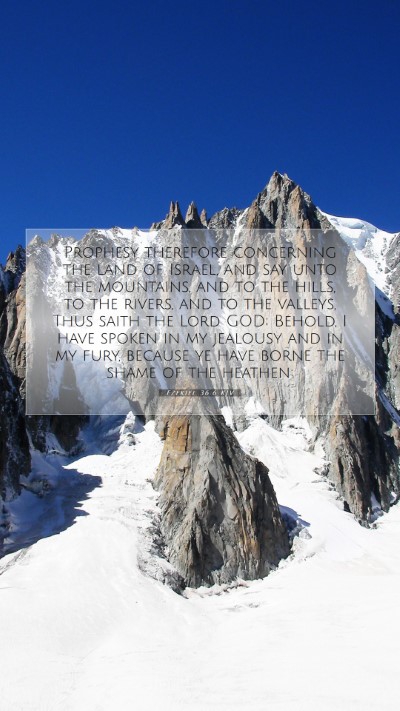Bible Verse Commentary: Ezekiel 36:6
Ezekiel 36:6 states: "Therefore prophesy concerning the land of Israel, and say to the mountains, and to the hills, to the ravines, and to the valleys: This is what the Sovereign Lord says: I am furious with the nations that are at ease; I was enraged with them for they arrogantly lived in safety; but I will grant prosperity to the land of Israel."
Overview of Ezekiel 36:6
This verse comes in the context of God's promise of restoration to Israel. Ezekiel, as a prophet, speaks directly to the land of Israel, illustrating God's concern not just for the people but for the land itself. The verse reflects God's anger towards the nations that have oppressed Israel while living in comfort.
Interpretative Insights from Commentaries
Matthew Henry's Commentary
Matthew Henry emphasizes the divine authority in the proclamation made through Ezekiel. He highlights how God’s fury is directed not only toward Israel's oppressors but also indicates a change in fortune for the land itself. Henry notes that the physical geographical features mentioned signify the entirety of Israel’s territory, which God aims to bless once more.
Albert Barnes' Notes
Albert Barnes explains the significance of the prophecy, underscoring that the restoration of the land is closely tied to the spiritual renewal of the people. He interprets God’s statement as both a warning to the nations and a reassurance to Israel. Barnes posits that the emphasis on 'mountains, hills, ravines, and valleys' conveys the idea that nothing in the land will be left untouched by God’s restorative power.
Adam Clarke's Commentary
Adam Clarke elaborates on the emotions expressed in this passage, specifically focusing on the 'fury' of the Lord toward complacent nations. He states that the assurance of prosperity to Israel comes with the understanding that their past trials are acknowledged, and divine favor is being restored. Clarke positions this verse within the broader narrative of hope and future restoration for a community that has suffered greatly.
Biblical Exegesis and Historical Context
This passage must be understood in light of Israel's tumultuous history. After numerous invasions and exiles, this prophecy signals a divine promise that transcends their present suffering. The reference to the land speaks to God's covenantal relationship with His people, where geographical and spiritual dimensions are intertwined.
Application of Ezekiel 36:6
To apply this verse to daily life, one must acknowledge the themes of restoration, hope, and divine intervention. It serves as a reminder that the struggles faced may lead to greater fulfillment and that God’s promises for rejuvenation are powerful and real.
Cross References
- Isaiah 35:1-2: “The wilderness and the dry land shall be glad; the desert shall rejoice and blossom like the crocus.”
- Jeremiah 32:41: “I will rejoice in doing them good and will assuredly plant them in this land with all my heart and soul.”
- Ezekiel 37:14: “I will put my Spirit in you and you will live, and I will settle you in your own land.”
Conclusion
This examination of Ezekiel 36:6 through various commentaries reveals a rich tapestry of meaning that underscores God’s love for His people amidst adversity. The interconnectedness of land, people, and divine promise invites a deeper understanding of how individual and collective renewal shapes the spiritual landscape. For those studying the Bible, this verse offers profound insights on restoration and divine promise that can be reflected upon and applied in various life situations.


